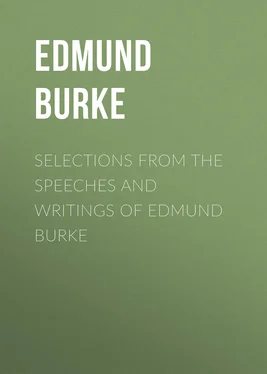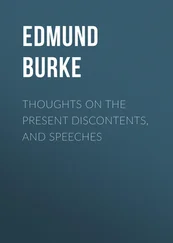Edmund Burke - Selections from the Speeches and Writings of Edmund Burke
Здесь есть возможность читать онлайн «Edmund Burke - Selections from the Speeches and Writings of Edmund Burke» — ознакомительный отрывок электронной книги совершенно бесплатно, а после прочтения отрывка купить полную версию. В некоторых случаях можно слушать аудио, скачать через торрент в формате fb2 и присутствует краткое содержание. Жанр: foreign_prose, История, Политика, literature_19, foreign_edu, foreign_antique, на английском языке. Описание произведения, (предисловие) а так же отзывы посетителей доступны на портале библиотеки ЛибКат.
- Название:Selections from the Speeches and Writings of Edmund Burke
- Автор:
- Жанр:
- Год:неизвестен
- ISBN:нет данных
- Рейтинг книги:4 / 5. Голосов: 1
-
Избранное:Добавить в избранное
- Отзывы:
-
Ваша оценка:
- 80
- 1
- 2
- 3
- 4
- 5
Selections from the Speeches and Writings of Edmund Burke: краткое содержание, описание и аннотация
Предлагаем к чтению аннотацию, описание, краткое содержание или предисловие (зависит от того, что написал сам автор книги «Selections from the Speeches and Writings of Edmund Burke»). Если вы не нашли необходимую информацию о книге — напишите в комментариях, мы постараемся отыскать её.
Selections from the Speeches and Writings of Edmund Burke — читать онлайн ознакомительный отрывок
Ниже представлен текст книги, разбитый по страницам. Система сохранения места последней прочитанной страницы, позволяет с удобством читать онлайн бесплатно книгу «Selections from the Speeches and Writings of Edmund Burke», без необходимости каждый раз заново искать на чём Вы остановились. Поставьте закладку, и сможете в любой момент перейти на страницу, на которой закончили чтение.
Интервал:
Закладка:
RETROSPECT AND RESIGNATION
You are but just entering into the world; I am going out of it. I have played long enough to be heartily tired of the drama. Whether I have acted my part in it well or ill, posterity will judge with more candour than I, or than the present age, with our present passions, can possibly pretend to. For my part, I quit it without a sigh, and submit to the sovereign order without murmuring. The nearer we approach to the goal of life, the better we begin to understand the true value of our existence, and the real weight of our opinions. We set out much in love with both: but we leave much behind us as we advance. We first throw away the tales along with the rattles of our nurses; those of the priest keep their hold a little longer; those of our governors the longest of all. But the passions which prop these opinions are withdrawn one after another; and the cool light of reason, at the setting of our life, shows us what a false splendour played upon these objects during our more sanguine seasons.
MODESTY OF MIND
If any inquiry thus carefully conducted should fail at last of discovering the truth, it may answer an end perhaps as useful, in discovering to us the weakness of our own understanding. If it does not make us knowing, it may make us modest. If it does not preserve us from error, it may at least from the spirit of error; and may make us cautious of pronouncing with positiveness or with haste, when so much labour may end in so much uncertainty.
NEWTON AND NATURE
When Newton first discovered the property of attraction, and settled its laws, he found it served very well to explain several of the most remarkable phenomena in nature; but yet with reference to the general system of things, he could consider attraction but as an effect, whose cause at that time he did not attempt to trace. But when he afterwards began to account for it by a subtle elastic aether, this great man (if in so great a man it be not impious to discover anything like a blemish) seemed to have quitted his usual cautious manner of philosophising: since, perhaps, allowing all that has been advanced on this subject to be sufficiently proved, I think it leaves us with as many difficulties as it found us. That great chain of causes, which linking one to another even to the throne of God himself, can never be unravelled by any industry of ours. When we go but one step beyond the immediate sensible qualities of things, we go out of our depth. All we do after is but a faint struggle, that shows we are in an element which does not belong to us.
THEORY AND PRACTICE
It is, I own, not uncommon to be wrong in theory, and right in practice; and we are happy that it is so. Men often act right from their feelings, who afterwards reason but ill on them from principle: but as it is impossible to avoid an attempt at such reasoning, and equally impossible to prevent its having some influence on our practice, surely it is worth taking some pains to have it just, and founded on the basis of sure experience.
INDUCTION AND COMPARISON
We must not attempt to fly, when we can scarcely pretend to creep. In considering any complex matter, we ought to examine every distinct ingredient in the composition, one by one; and reduce everything to the utmost simplicity; since the condition of our nature binds us to a strict law and vary narrow limits. We ought afterwards to re-examine the principles by the effect of the composition, as well as the composition by that of the principles. We ought to compare our subject with things of a similar nature, and even with things of a contrary nature; for discoveries may be, and often are, made by the contrast, which would escape us on the single view. The greater number of the comparisons we make, the more general and the more certain our knowledge is likely to prove, as built upon a more extensive and perfect induction.
DIVINE POWER ON THE HUMAN IDEA
Whilst we consider the Godhead merely as he is an object of the understanding, which forms a complex idea of power, wisdom, justice, goodness, all stretched to a degree far exceeding the bounds of our comprehension, whilst we consider the Divinity in this refined and abstracted light, the imagination and passions are little or nothing affected. But because we are bound, by the condition of our nature, to ascend to these pure and intellectual ideas, through the medium of sensible images, to judge of these divine qualities by their evident acts and exertions, it becomes extremely hard to disentangle our idea of the cause from the effect by which we are led to know it. Thus, when we contemplate the Deity, his attributes and their operation, coming united on the mind, form a sort of sensible image, and as such are capable of affecting the imagination. Now, though in a just idea of the Deity, perhaps none of his attributes are predominant, yet, to our imagination, his power is by far the most striking. Some reflection, some comparing, is necessary to satisfy us of his wisdom, his justice, and his goodness. To be struck with his power, it is only necessary that we should open our eyes. But whilst we contemplate so vast an object, under the arm, as it were of almighty power, and invested upon every side with omnipresence, we shrink into the minuteness of our own nature, and are, in a manner, annihilated before him.
UNION OF LOVE AND DREAD IN RELIGION
True religion has, and must have, a large mixture of salutary fear; and false religions have generally nothing else but fear to support them. Before the Christian religion had, as it were, humanized the idea of the Divinity, and brought it somewhat nearer to us, there was very little said of the love of God. The followers of Plato have something of it, and only something; the other writers of pagan antiquity, whether poets or philosophers, nothing at all. And they who consider with what infinite attention, by what a disregard of every perishable object, through what long habits of piety and contemplation it is that any man is able to attain an entire love and devotion to the Deity, will easily perceive that it is not the first, the most natural and the most striking, effect which proceeds from that idea.
OFFICE OF SYMPATHY
Whenever we are formed by nature to any active purpose, the passion which animates us to it is attended with delight, or a pleasure of some kind, let the subject-matter be what it will; and as our Creator had designed that we should be united by the bond of sympathy, he has strengthened that bond by a proportionable delight; and there most where our sympathy is most wanted,—in the distresses of others.
WORDS
Natural objects affect us, by the laws of that connexion which Providence has established between certain motions and configurations of bodies, and certain consequent feelings in our mind. Painting affects in the same manner, but with the superadded pleasure of imitation. Architecture affects by the laws of nature, and the law of reason; from which latter result the rules of proportion, which make a work to be praised or censured, in the whole or in some part, when the end for which it was designed is or is not properly answered. But as to words; they seem to me to affect us in a manner very different from that in which we are affected by natural objects, or by painting or architecture; yet words have as considerable a share in exciting ideas of beauty and of the sublime as many of those, and sometimes a much greater than any of them.
NATURE ANTICIPATES MAN
Whenever the wisdom of our Creator intended that we should be affected with anything, he did not confide the execution of his design to the languid and precarious operation of our reason; but he endued it with powers and properties that prevent the understanding, and even the will; which, seizing upon the senses and imagination, captivate the soul before the understanding is ready either to join with them, or to oppose them. It is by a long deduction, and much study, that we discover the adorable wisdom of God in his works: when we discover it, the effect is very different, not only in the manner of acquiring it, but in its own nature, from that which strikes us without any preparation from the sublime or the beautiful.
Читать дальшеИнтервал:
Закладка:
Похожие книги на «Selections from the Speeches and Writings of Edmund Burke»
Представляем Вашему вниманию похожие книги на «Selections from the Speeches and Writings of Edmund Burke» списком для выбора. Мы отобрали схожую по названию и смыслу литературу в надежде предоставить читателям больше вариантов отыскать новые, интересные, ещё непрочитанные произведения.
Обсуждение, отзывы о книге «Selections from the Speeches and Writings of Edmund Burke» и просто собственные мнения читателей. Оставьте ваши комментарии, напишите, что Вы думаете о произведении, его смысле или главных героях. Укажите что конкретно понравилось, а что нет, и почему Вы так считаете.












